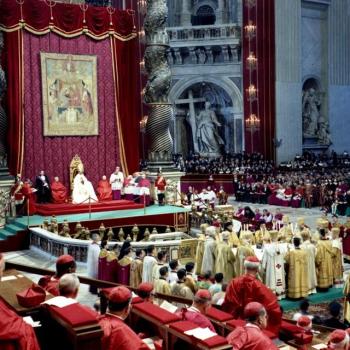Editor's Note: This article is part of the symposium, "What Is Progressive Christianity?" presented by the newly launched Patheos Progressive Christian Portal and in partnership with the Wild Goose Festival (June 23-26). Like us on Facebook to receive today's best commentary on Progressive Christianity.
The Rev. Dr. Martin Luther King, Jr. used to speak with conviction some fifty years ago about how churches that weren't involved in real-world action would become nothing more than irrelevant social clubs. He wasn't, of course, talking about those Protestant mainline, African-American, and Catholic congregations who entered the world, fed, sheltered, educated, and advocated. But, paradoxically, some of those Christians were so in that world that social action gradually became their religion. As Diana Butler Bass noted in Christianity for the Rest of Us, in the process of pursuing what some called the Social Gospel, many progressive Christians traded in liberality for liberalism, a spiritual trait for a political stance (192).
Social action matters. But Dr. King was a Baptist minister. He wasn't a social worker or a political activist, although his ministry was both social and political. He came to his convictions about religion's real-world relevance through his faith in God as the one who liberates and loves. Social Gospel that doesn't grow out of the good news of God revealed through Jesus Christ isn't religious, and while it might be (and is) in line with the life and teachings of Jesus, I would propose a counter-truth to Dr. King's statement about irrelevant churches: I don't believe God is any happier about churches that worship justice instead of Jesus, about pews filled merely by relevant social workers.
Many of us who are seeking a faithful progressive Christianity are no more satisfied by a faith that apologizes for itself by fixating on a political or secular social justice agenda than we are by one that focuses purely on individual salvation or personal piety. We want to be personally transformed as well as to help transform the world. We seek a Christianity that incorporates heart and head, a practice that is true to Augustine's Two-Fold Commandment by insisting that we love God as well as our neighbors—and that, in truth, we are able to love our neighbors fully only because we love and are loved by God.
What I'd propose as an underlying theology for a 21st-century progressive Christianity is our belief and participation in what theologians call, variously, "realized eschatology" or "inaugurated eschatology," an understanding that Jesus became incarnate to inaugurate a new act of God's drama. Realized eschatology theorizes that the Kingdom of God that Jesus came to preach and enact was present with (and within) him (not in some future apocalypse), and in him a rebirth of the world began, a rebirth that continues in our time and that constitutes a mission for the Church, as Dr. King knew, beyond individual salvation.
In the Jewish tradition, the great rabbi Abraham Joshua Heschel, who marched with Dr. King, said, "The exodus began, but is far from having been completed." Translated to Christian terms, this is what we should also believe. In realized eschatology, we are not the sort of believers pushing God's action back to the end of time and waiting passively for that day to come. Neither are we imagining that since God has launched that action, all will be accomplished if we only work hard enough. Instead, we are in the place of now and not yet that biblical scholars and theologians often use when they talk about the Kingdom of God: Jesus came preaching conversion, spiritual reorientation, and the beginning of God's reign on earth, and he began to teach, heal, feed, and show how that kingdom looked. The powers of the world tortured and killed him; God raised him to confirm that Jesus was indeed the nexus around which the new world would emerge, a world in which sin, pain, and death would no longer have power.
Theologians, lay and ordained, have articulated these teachings—from the 19th-century Cambridge scholar C.H. Dodd, who coined the term "realized eschatology," to, among others, N. T. Wright, Pope Benedict XVI, Brian McLaren, Bono, and me in our time. I think those Christians who want to follow Jesus in a way that will be personally and societally meaningful today can latch onto this core principle as a way of organizing and understanding their faith. Wright, particularly, has spoken about how the Kingdom teachings in the Gospels are the core of Jesus' message, and has written about what the Lord's Prayer, which many of us say one or more times a week, might teach us about faith and belief today:





